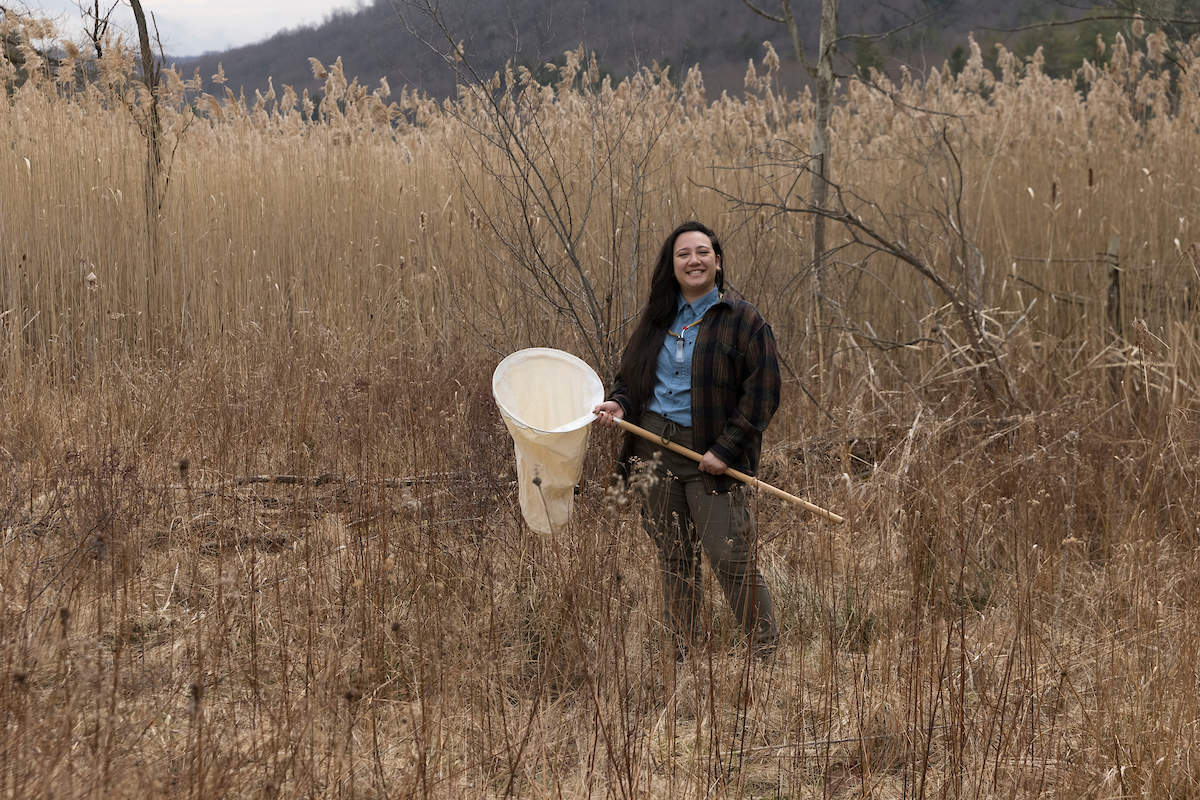Citizen scientist: Community is invited to study the natural world during EcoBlitz

What calls the Binghamton University campus home, whether on four legs, or six, or eight? What grows beneath the shade of its trees, flies between the branches or dwells in its ponds, too small to see with the naked eye?
During Binghamton’s first-ever EcoBlitz, you can help the campus community find out.
“I tell people that it’s like real-life Pokemon Go,” said EcoBlitz coordinator Carmela Buono, a doctoral candidate in biological sciences who has spent a year organizing the event. “What we want to find out is: What kind of species are found on campus? What is the water quality in a place like Lake Lieberman?”
Hosted by the Center for Integrated Watershed Studies, the community science effort begins with a kickoff event from 10 a.m. to 3 p.m. April 30 at the Binghamton University Nature Preserve, featuring nature tours, craft activities, pond sampling, bird watching, a scavenger hunt and more.
Can’t make the event? You can still participate by collecting data during your free time from April 30 to May 13. Data collection throughout the EcoBlitz will take place on all of the University’s properties, from the campus itself to the Nature Preserve and Nuthatch Hollow. Visit the EcoBlitz website to learn more.
And you don’t have to be an official member of the campus community to take part, either. Everyone is welcome, from community groups to hikers visiting the Nature Preserve, although the inaugural event particularly hopes to involve campus researchers, University courses, campus student groups and local community groups in the data collection efforts. Groups already participating include the Audubon Society, the Sustainability Hub, the Ross Park Zoo, the University’s biology and environmental science labs, the Zero Hour environmental justice organization, and classes in urban ecology and plant ecology.
“There are so many environmentally passionate groups on campus. Why not harness that, and do something really fun and collect data about what we have on campus?” Buono said.
The data will be collected and submitted via iNaturalist, a free community science app. You can use the app, for example, to upload a picture of a plant. The app will help you identify it, and also collect information such as the time of day, Buono explained.
“Public participation in ecological data collection serves several purposes, including increasing awareness surrounding the importance of protecting and conserving biodiversity and natural systems. Documenting what we have will also help collect baseline information to understand how our natural areas might be changing under anthropogenic change, such as climate change,” said Assistant Professor of Biological Sciences Kirsten Prior, the event’s co-organizer and Buono’s mentor.
Engaging the younger generation is critical to instill a sense of appreciation and responsibility for conservation, she said. To that end, EcoBlitz includes several nature-themed activities for children, including engaging them in data collection and species identification, she said.
In her native New Jersey, Buono participated in a similar event at Rutgers University, her alma mater. These events, known as BioBlitzes, happen at sites all over the world, in which citizen-scientists come together during a designated period of time to conduct an intensive field study. The very first BioBlitz dates back to 1996 in Washington, D.C.’s Kenilworth Aquatic Gardens.
The seed of EcoBlitz
EcoBlitz combines the Center for Integrated Watershed Studies’ research and community engagement missions, said the center’s director, Associate Professor of Biological Sciences Jessica Hua. And while it’s modeled after the BioBlitz, Binghamton’s event is also unique in that it emphasizes the center’s interdisciplinary nature by inviting community partners not only to observe and identify plant, animal and fungi species, but also geological and environmental toxicological data, such as soil moisture, organic matter content, pH, conductivity, nitrogen, rock and fossil identification, Hua said.
“Interdisciplinary efforts and community engagement are crucial to studying the environment, and what’s exciting about this event is that researchers, educators, students, and community organizations and members are all coming together with the common goal of documenting and learning about the ecology of our natural areas,” Prior added.
Buono is a natural at organizing and leading the event, as a talented ecologist with a passion for outreach, Prior said. As her research mentor, Prior has seen firsthand the breadth of knowledge the doctoral student has about the diversity and ecology of natural systems, particularly local forest ecosystems.
Buono, whose own doctoral research focuses on ants, will be out in the field herself when she’s not in class. And like a healthy ecosystem, she hopes the event becomes self-sustaining.
“My ultimate goal for this event is to bring together the campus community and the local community to appreciate the outdoors and harness the power of citizen science,” Buono said. “I’d love to come back after I graduate and see that the EcoBlitz is still happening, a day everywhere when the community comes together to appreciate what we have on campus.”
